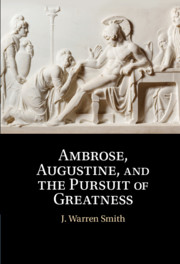Book contents
- Ambrose, Augustine, and the Pursuit of Greatness
- Ambrose, Augustine, and the Pursuit of Greatness
- Copyright page
- Dedication
- Contents
- Acknowledgments
- Abbreviations
- Introduction
- Part I The Problem of Greatness and the Great-Souled Man from Plato to Plutarch
- Part II Ambrose’s Great-Souled Christians
- 3 Ambrose
- 4 Toward a Higher Standard of Greatness
- 5 Humiliation without Shame or Resentment
- Part III Augustine and the Magnus Animus
- Epilogue
- Bibliography
- Index
5 - Humiliation without Shame or Resentment
from Part II - Ambrose’s Great-Souled Christians
Published online by Cambridge University Press: 24 November 2020
- Ambrose, Augustine, and the Pursuit of Greatness
- Ambrose, Augustine, and the Pursuit of Greatness
- Copyright page
- Dedication
- Contents
- Acknowledgments
- Abbreviations
- Introduction
- Part I The Problem of Greatness and the Great-Souled Man from Plato to Plutarch
- Part II Ambrose’s Great-Souled Christians
- 3 Ambrose
- 4 Toward a Higher Standard of Greatness
- 5 Humiliation without Shame or Resentment
- Part III Augustine and the Magnus Animus
- Epilogue
- Bibliography
- Index
Summary
By recasting magnanimitas within the ideal of Christian perfection as mercy, especially to one’s enemies, Ambrose gave “greatness of soul” a meaning not expressly contained in Aristotle’s notion of the great-souled man. Thus it was the Middle Platonists, such as Plutarch, and Christians, such as Ambrose, who gave μεγαλοψυχία a meaning much closer to the modern connotation of “magnanimity.” Aristotle’s concern to inculcate in his protégés the right attitude toward honor that was the core of μεγαλοψυχία was not lost on later generations. Late antique Rome was every bit as much an honor–shame culture as was Athens in the fourth century before Christ, and public honors continued to be determinative of social status. They were society’s acknowledgement of virtuous individuals whose excellence established the norms of conduct to be imitated. Conversely, shaming was society’s condemnation of what was deemed base and ignoble. Conferring honor or shame set the norms by which an individual might gauge the value of her life within society. Indeed, the external character of honor and shame raised a profound problem: How was the truly virtuous person to think of his worth when society’s judgment of virtue and vice was itself misguided? In a culture where an individual’s identity was so closely bound to one’s politeia, what happened to a virtuous person’s sense of identity when one’s rulers or the polis itself scorned rather than honored his excellence? This is Achilles’ existential crisis.
- Type
- Chapter
- Information
- Ambrose, Augustine, and the Pursuit of Greatness , pp. 168 - 192Publisher: Cambridge University PressPrint publication year: 2020



